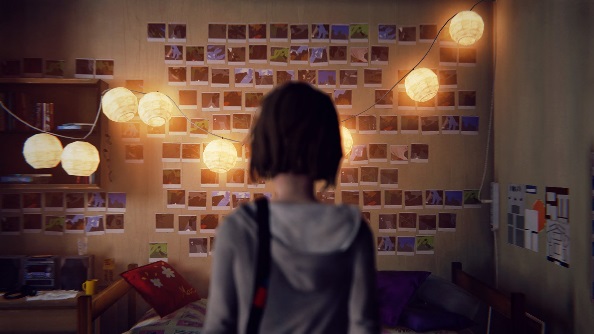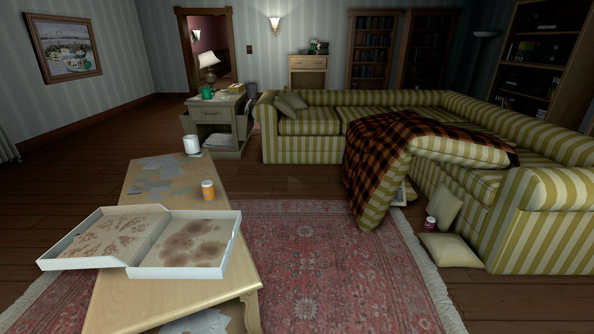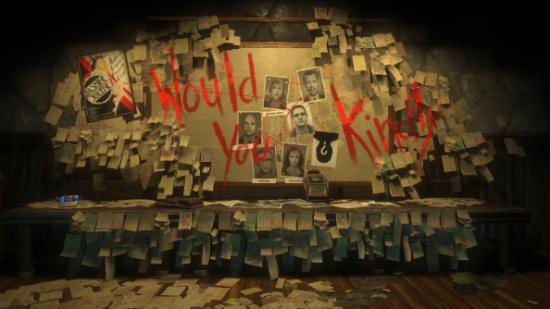A big videogame is released. If you care even remotely about it, these are the things you’ll kiss goodbye to until you get to experience it, in its entirety, for yourself: social media. Comments sections. Forums. The radio. Rolling news. Twitch. Podcasts. Conversations with friends you don’t entirely trust. Public transport. Imgur. Ideally, absolutely all contact with the human race.
The good thing about the best racing games on PC, other than their intrinsic value, is that they can’t be spoiled. Take that, internet jerks!
Then, some time later, you emerge from your pop culture Robinson Crusoe exile and resume everyday life, suddenly self-satisfied when conversations arise with others who haven’t played it yet, able to relax for the first time since the game came out.
You do this in case someone might have spoiled it for you.
Now look, I’m all for the death of social media and a bit of alone time. But it seems to me that somewhere between the last Harry Potter book and the new Star Wars movie, we’ve all put ourselves at the mercy of those perculiar people to take pleasure in circulating spoilers. The more we use that word, the more we’re reinforcing the idea that our enjoyment of a given narrative absolutely hinges on our experiencing it without any prior knowledge. And that gives the spoilers power.
(There is precisely one spoiler in this article and it’s about the 1964 Burt Lancaster movie, The Train.)

The use of the word “spoiler” in reference to a snippet of information that gives away an important plot point and thus diminishes your enjoyment of a story actually goes back quite a long way. Visual Thesaurus’s research indicates that Year Zero for the spoiler was the April 1971 issue of National Lampoon magazine. In it, writer Douglas C. Kenney presents, “as a public service, a selection of ‘spoilers’ guaranteed to reduce the risk of unsettling and possibly dangerous suspense.”
It reads like a TV guide written by the devil himself. A lifetime of books and films are boiled down to their most reductive, suspense-killing synopses. For example: “The Train: Burt Lancaster stops it.”
He asks that “you read them over several times and, if possible, commit them to memory before you venture into the actual book or late night movie.” The interesting thing about reading Kenney’s article in 2016 is how familiar its humour is, and how informed by internet culture it feels. That same sarcastic tone is present in spoilers today, and that same economy of words is used to tear down a narrative that took hundreds of pages of script to build.

The difference between Kenney’s 1971 article and current spoiler culture is in the intent. What was once a rye, mischievous observation has become a stranger shouting at you from somewhere in the internet either: “Hey you! HEY! Yeah, you! F*** you and the things you enjoy.”
That stranger does this for two reasons. One: spoilers are an incredibly efficient means to exert a form of power on a large group using minimal effort. They utter three or four words at you, and you then inexorably bind them to the game they just spoiled for you. They’re one of the main characters, standing next to Shepard and Liara, sniggering the whole time while you try to stay immersed in the plot.
Two: they do it because we give them all that power. We allow ourselves to get angry when someone deliberately gives away an important plot point, and that gives them gratification. We use the word ‘spoiler’ to describe what they’ve just done, conveying the idea that they’ve been successful in ruining your enjoyment. It doesn’t have to be that way.

I’m not saying you don’t have a right to enjoy a videogame without prior knowledge of its plot, or indeed that you don’t have a right to be angry when someone maliciously attempts to hinder your enjoyment of it. Instead, I’m saying you have a choice about whether to get angry about it, and whether to enjoy that videogame anyway, with full knowledge of the plot twist that the preceding 20 hours have been building towards.
And when you choose not to get angry, when you choose to enjoy it anyway, the spoilers stop being spoilers. You’ve dissembled the apparatus that the internet stranger who wanted to ruin your day was using to do so.
Consider how many famously twist-laden fims you’ve started with at least some knowledge of the conclusion. Speaking personally, I watched Fight Club, The Sixth Sense, and The Usual Suspects having been told the twist beforehand. They remain some of my favourite movies. You’ll have a stack of movies just like that too, no doubt.
Then there’s classic literature. Somehow we seem absorb the plots to these famous tales long before we actually sit down to read them – Romeo & Juliet, Frankenstein, 1984, Moby Dick etc – but far from considering them ruined, we give them our time anyway, because we know there’s value in the connective tissue between the plot points we already know, that we can appreciate the craftsmanship of the storytelling, and enjoy getting to know the characters.

In fact, there’s even some evidence to suggest that spoilers don’t actually impact on our enjoyment of a story at all. An experiment conducted on 12 participants at UC San Diego (via Wired) gave half of them stories to read with prefaces featuring spoilers, and half without the prefaces. The results indicated that, by and large, participants actually enjoyed reading the stories more after reading the spoiler first.
In short, there’s more to a narrative than its conclusion. If there wasn’t, M. Night Shyamalan would be hailed as the greatest filmmaker of modern times. And nowhere is the idea of the value of narrative being in the journey rather than the destination more true than in the only interactive storytelling medium: videogames.
Next time someone honks the conclusion to a game at you, maliciously or not, remember that you’re choosing whether or not to get angry, whether or not to use the word ‘spoiler,’ and most importantly whether or not to let it impact your enjoyment.
And, over time, watch the whole concept melt away.
